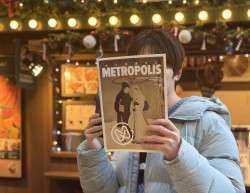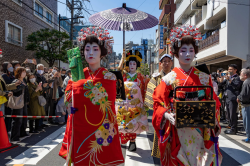
March 12, 2015
Small Print: March 12, 2015
Meat mishaps, no-stick natto, political mysogyny, and more ...
“It’s like creating art, writing words in space”
—Ruruka Minami, founder of a sign-language performance troupe in Shibuya that’s celebrating its 25th anniversary
FINDINGS
- Researchers at Kyoto University have discovered that wild Japanese macaque monkeys greet each other differently based on where they grew up.
- Workers on a renovation project at Yakushi-ji in Nara were shocked to find that termites have almost completely destroyed the 1,300-year-old temple’s central pillar.
- A research team that includes staff at Tokyo’s National Museum of Nature believe a human jawbone found on off the coast of Taiwan came from “a new type of primitive man.” The fossil is thought to be 500,000 years old.
- A Kanagawa-based researcher who studies garbage that washes up on Japanese beaches says three percent of the refuse comes from Japan and four percent from South Korea.
WELL, THAT EXPLAINS IT
- Managers at Mitsukoshi department store in Nagoya apologized for selling nori rolls with raw meat inside. They blamed the mishap on a staff member who “forgot to deep-fry [the] pork cutlets.”
- Planet Sigma, a movie by Japanese director Momoko Seto, won the top prize for shorts at the Berlin International Film Festival. The film “captures the development of such things as insects and mushrooms in slow motion.”
- Police in Shinjuku say three workers at a boutique in the Lumine Est department store broke into the storeroom of a rival shop and stole apparel worth ¥1.1 million, which they then sold online.
- Headline of the Week: “Manufacturers Look to Spread Less Sticky Natto Around the World” (via Mainichi Japan)
3,000
|
663
|
1.13 million
|
SLICK OPERATORS
- It was reported that the families of the 19 members of Prime Minister Abe’s Cabinet hold an average of ¥87.82 million in assets.
- That’s an increase of ¥910,000 from Abe’s previous Cabinet.
- Finance Minister Taro Aso topped the list, with a family fortune of ¥491 million.
- And—go figure—women’s empowerment minister Haruko Arimura had the lowest assets, at ¥1.25 million yen.
HITHER & YON
- A survey conducted by a Tokyo-based NGO has found that Yamanashi is the most popular destination for people who are considering a move to rural areas.
- Officials in suburban Musashino have begun offering guided tours of sites that sustained damaged by U.S. bombers in World War II.
- Justices on the Tokyo High Court told the defense ministry to compensate Mitsubishi Heavy Industries ¥35 billion for ordering—and then canceling—more than 50 attack helicopters.
- A Fuji TV employee who traveled to Turkey to cover the kidnapping of two Japanese nationals by Islamic State militants died in a car crash near the Syrian border.
AND FINALLY…
- Authorities at the justice ministry say police around the country applied for 26 court orders last year to eavesdrop on private conversations. All 26 were granted.
- The finance ministry says customs officials seized 630 kilograms of illegal drugs in 2014, a drop of 37 percent from the year before.
- A Cabinet Office secretary attended the annual Takeshima Day ceremony, which takes place on islands in the Sea of Japan that are also claimed by South Korea.
- Yutaka Katayama, Nissan executive who played a key role in developing the automaker’s fabled Z cars, died of heart failure at a hospital in Tokyo. He was 105.
Compiled from reports by AP, Japan Today, The Japan Times, Jiji, The Tokyo Reporter, The Mainichi, The Japan News, AFP, Reuters and Kyodo







